人教版(2019)必修第三册 Morals and Virtues Discovering Useful Structures课件(共39张PPT)
文档属性
| 名称 | 人教版(2019)必修第三册 Morals and Virtues Discovering Useful Structures课件(共39张PPT) |  | |
| 格式 | pptx | ||
| 文件大小 | 1.4MB | ||
| 资源类型 | 教案 | ||
| 版本资源 | 人教版(2019) | ||
| 科目 | 英语 | ||
| 更新时间 | 2025-03-02 12:10:09 | ||
图片预览

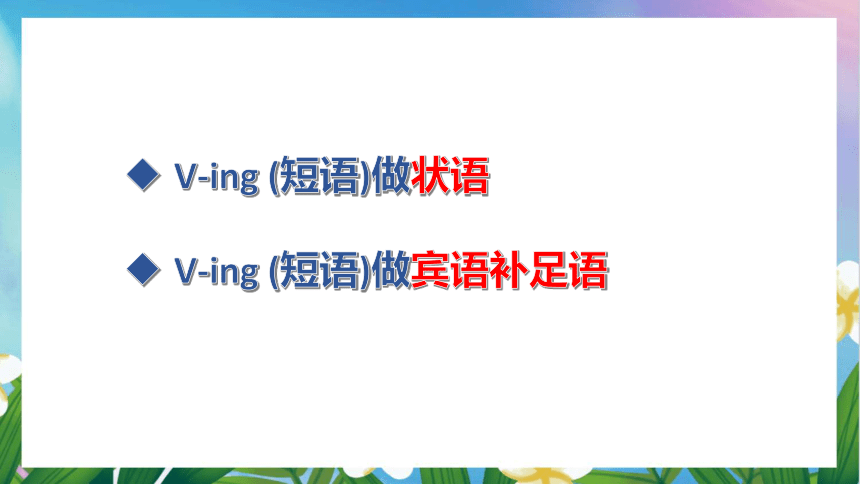
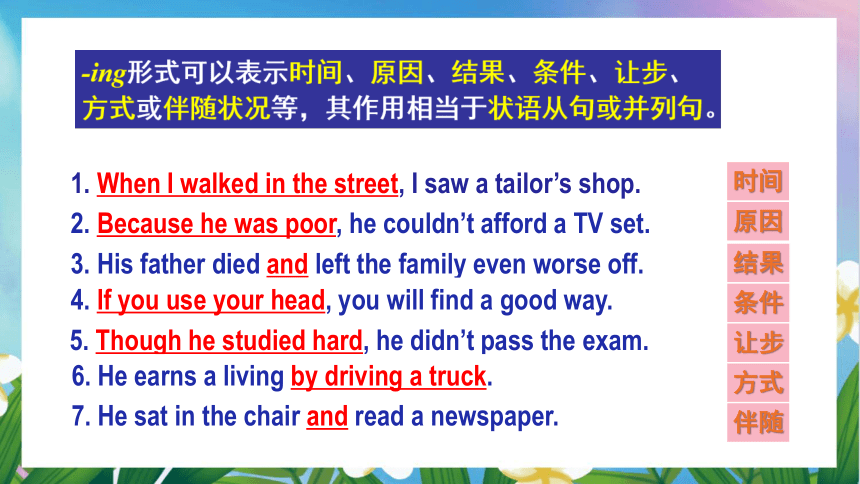
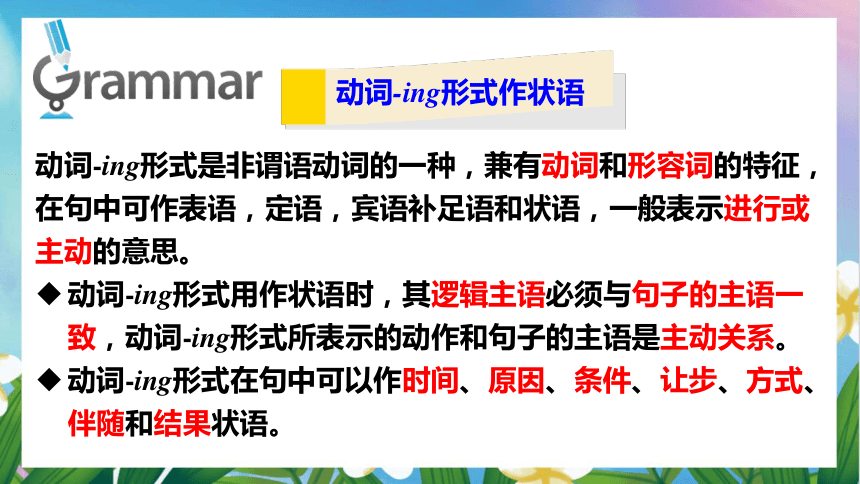
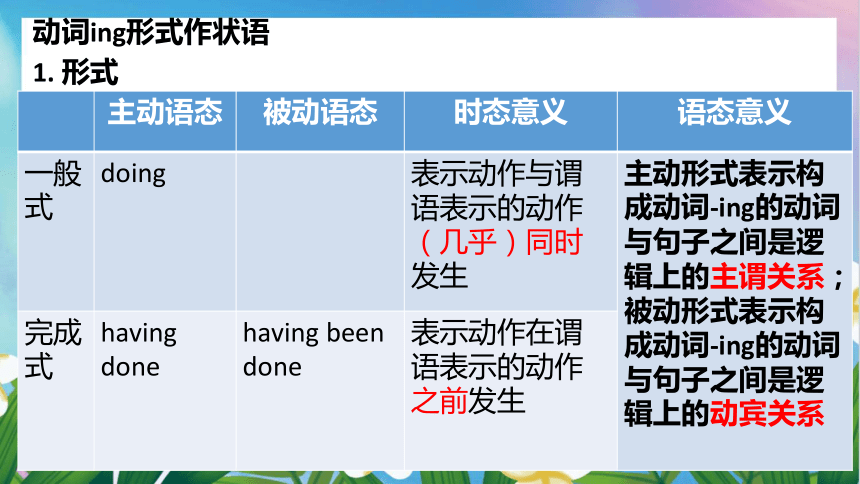
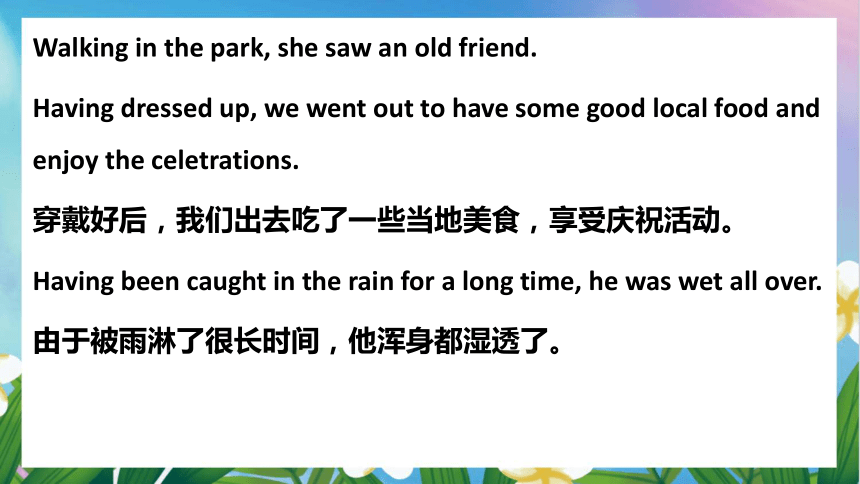
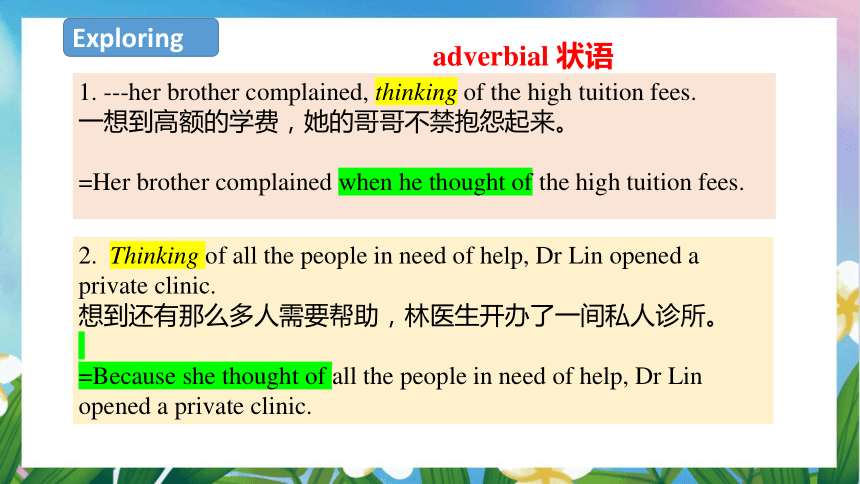
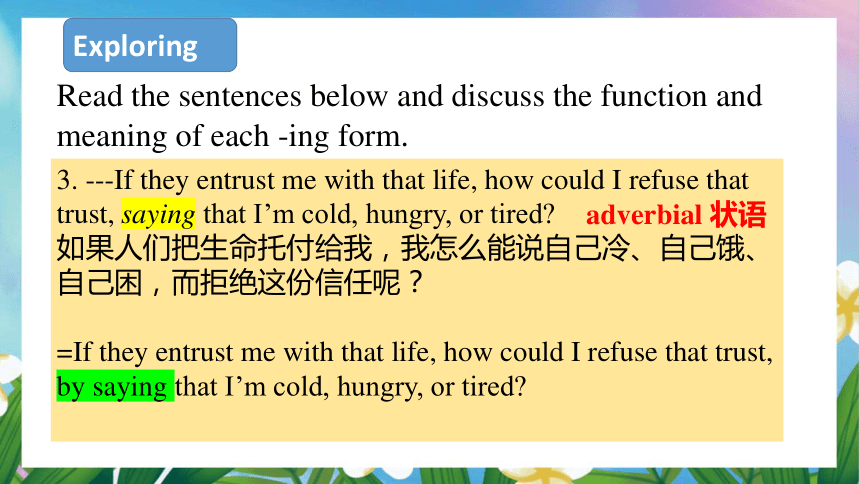
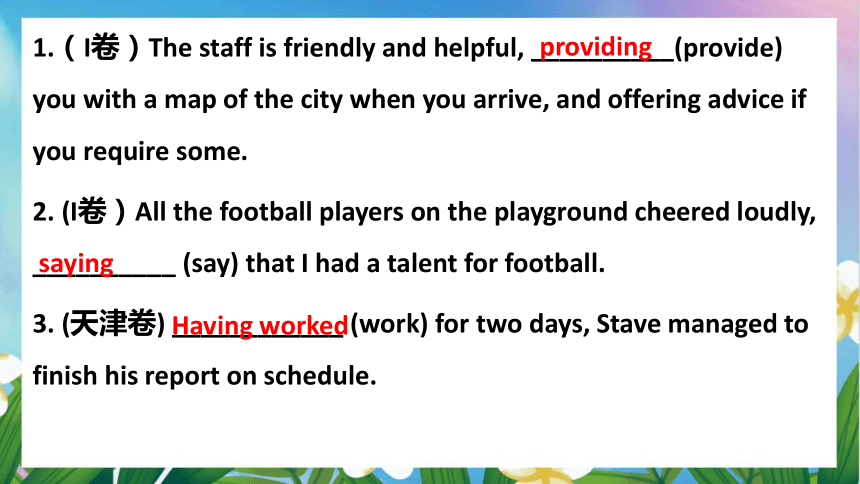
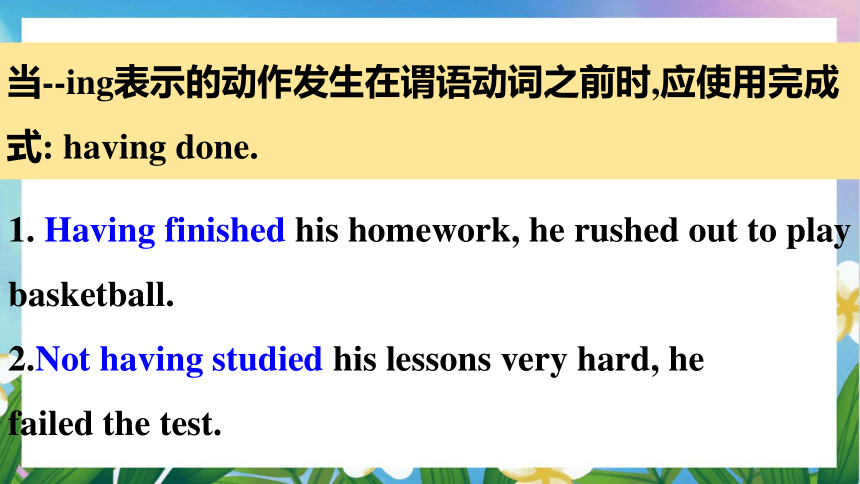


文档简介
(共34张PPT)
Unit 2 Morals and Virtues
Discovering Useful Structures
V-ing (短语)做状语
V-ing (短语)做宾语补足语
1. Walking in the street, I saw a tailor's shop.
2. Being poor, he couldn't afford a TV set.
3. His father died, leaving the family even worse off.
4. Using your head, you will find a good way.
5. Studying hard, he didn't pass the exam.
6. He earns a living driving a truck.
7. He sat in the chair reading a newspaper.
时间
原因
结果
条件
让步
方式
伴随
1. When I walked in the street, I saw a tailor’s shop.
2. Because he was poor, he couldn’t afford a TV set.
3. His father died and left the family even worse off.
5. Though he studied hard, he didn’t pass the exam.
4. If you use your head, you will find a good way.
7. He sat in the chair and read a newspaper.
6. He earns a living by driving a truck.
动词-ing形式是非谓语动词的一种,兼有动词和形容词的特征,在句中可作表语,定语,宾语补足语和状语,一般表示进行或主动的意思。
动词-ing形式用作状语时,其逻辑主语必须与句子的主语一致,动词-ing形式所表示的动作和句子的主语是主动关系。
动词-ing形式在句中可以作时间、原因、条件、让步、方式、伴随和结果状语。
动词-ing形式作状语
动词ing形式作状语
1. 形式
主动语态 被动语态 时态意义 语态意义
一般式 doing 表示动作与谓语表示的动作(几乎)同时发生 主动形式表示构成动词-ing的动词与句子之间是逻辑上的主谓关系;被动形式表示构成动词-ing的动词与句子之间是逻辑上的动宾关系
完成式 having done having been done 表示动作在谓语表示的动作之前发生
Walking in the park, she saw an old friend.
Having dressed up, we went out to have some good local food and enjoy the celetrations.
穿戴好后,我们出去吃了一些当地美食,享受庆祝活动。
Having been caught in the rain for a long time, he was wet all over.
由于被雨淋了很长时间,他浑身都湿透了。
1. ---her brother complained, thinking of the high tuition fees.
一想到高额的学费,她的哥哥不禁抱怨起来。
=Her brother complained when he thought of the high tuition fees.
adverbial 状语
Exploring
2. Thinking of all the people in need of help, Dr Lin opened a private clinic.
想到还有那么多人需要帮助,林医生开办了一间私人诊所。
=Because she thought of all the people in need of help, Dr Lin opened a private clinic.
Read the sentences below and discuss the function and meaning of each -ing form.
Exploring
3. ---If they entrust me with that life, how could I refuse that trust, saying that I’m cold, hungry, or tired
如果人们把生命托付给我,我怎么能说自己冷、自己饿、自己困,而拒绝这份信任呢?
=If they entrust me with that life, how could I refuse that trust, by saying that I’m cold, hungry, or tired
adverbial 状语
1.(I卷)The staff is friendly and helpful, __________(provide) you with a map of the city when you arrive, and offering advice if you require some.
2. (I卷)All the football players on the playground cheered loudly, __________ (say) that I had a talent for football.
3. (天津卷) ____________ (work) for two days, Stave managed to finish his report on schedule.
providing
saying
Having worked
1. Having finished his homework, he rushed out to play basketball.
2.Not having studied his lessons very hard, he
failed the test.
当--ing表示的动作发生在谓语动词之前时,应使用完成式: having done.
探究点1 动词-ing形式作状语
1.作时间状语(相当于一个时间状语从句)
Hearing the knock on the door, they stopped talking.
=When they heard the knock on the door, they stopped talking.
听到有人在敲门, 他们停止了谈话。
2.作原因状语(相当于一个原因状语从句)
Being ill, he didn’t go to school yesterday.
=As he was ill, he didn’t go to school yesterday.
因为他生病了, 昨天他没去上学。
2. 动词ing形式作状语时的注意事项
1)动词ing形式作状语时,为明确状语类型,有时可在其前面加上相应的从属连词( when, while, since, once, unless, as if, even if, though...)
doing
(I卷) She decided to go back to college to advance(促进) her career and to be able to better support her family while _________(do) something she loves: nuring.
3.作伴随状语
(动词-ing形式表示的动作与谓语动词表示的动作同时发生, 相当于一个并列谓语)
They stood there, waiting for the bus.
=They stood there and waited for the bus.
他们站在那儿等公共汽车。
4.作结果状语(表示自然而然的结果, 不定式短语作结果状语表示事与愿违的结果)
The hospital has recently obtained new medical equipment, allowing more patients to be treated.
最近这家医院已经获得了新的医疗设备, 能让更多的病人得到治疗。
He hurried to the station, only to find that the train had left.
He hurried to school, only to be told it was Sunday today.
2) 动词ing形式作状语时,其逻辑主语一般和句子主语一致
My wife had a long talk with Sally, explaining why she didn’t want the children to play togther.
我的妻子和萨利谈了很长时间,解释她为什么不想让孩子们一起玩。
5.作条件状语(相当于一个条件状语从句)
Working hard, you’ll surely succeed.
=If you work hard, you’ll surely succeed.
你如果努力工作, 就一定会成功。
6.作让步状语(相当于一个让步状语从句)
Not being a rich man, he helped the poor generously.
=Although he was not a rich man, he helped the poor generously.
尽管他自己不算富裕, 他却慷慨地帮助穷人。
3) 动词ing形式的否定式时“not/never + 动词ing”
(四川)___________ (know) which university to attend, the girl asked her teacher for advice.
Not knowing
4)有些动词-ing短语已成为习惯用语,用来修饰整个句子,作状语
judging from/by... 从...来判断
supposing.... 假设.... assuming..... 假如
providing that... 假如....
frankly speaking.... 坦白地说...
cosidering... 考虑到....
seeing that... 鉴于...;既然...
generally speaking....一般来说
3. He is a popular professor who makes great contributions to our society. The great man worked in hospital, __________(diagnose) coronavirus.
伴随状语
Practice
diagnosing
1. _________(heat) the metal, we can see the metal expands.
2. _____________(heat), the metal expands.
Practice
Heating
Being heated
Practice
3. He felt his heart (puond) violently when it was his turn to give a speech.
4. (finish) the project, he went to Germany for a short vacation.
5. The woman was smiling when she saw his son (award) a prize on the stage.
pounding
Having finished
being awarded
观察归纳:
动词-ing形式作宾语补足语常放在宾语后面, 对宾语进行补充说明表示一个____________________的动作, 强调一个过程或一种状态。
正在进行的主动性
1. 读句子,思考V-ing 作宾语补足语的作用是什么?
1) When we returned to the school, we found a
stranger standing at the entrance.
2) The boss kept the workers working the whole night.
2. 动词-ing形式作宾补
1)形式
形式 时态意义 语态意义
主动:doing 表示正在进行 主动形式表示构成动词-ing的动词与句子宾语之间是逻辑上的主谓关系
被动:being done 被动形式表示构成动词-ing的动词与句子宾语之间是逻辑上的动宾关系
时间/语态 Active主动 Passive被动
同时发生(进行) doing being done
被动(完成) done
非谓语动词先发生 (已完成) having done
having been done
注意:否定形式:not/never + v-ing
Translate the following sentences.
1. 说出真相后,他心里 轻松了许多
____________________ , he felt greatly relieved.
Having told the truth
2. 我瞄了一眼教室,却发现同学们都面露微笑,眼含泪水。
I glanced around the classroom, _____________ my classmates _________________ on their faces, ___________________________
only to find
bearing big smiles
tears welling up in their eyes.
2. 动词-ing形式作宾补的用法
1)在see, hear, feel, smell, watch, notice, find, observe 等表示感官和心理状态的动词后作宾补,表示动作正在进行,并非全过程
Now, I see my children taking their children to the library and I love it that the excitement of going to the library lives on from generation to generation.
现在,我看到我的孩子们带着他们的孩子去图书馆,而且去图书馆的那种兴奋感一代代穿了下来,这一点让我很喜欢(II卷)
(1) When we got to school, we saw the door locked.
(2) He found his house broken into when he got back home.
(3) I feel the computer moved by someone.
现在分词用作宾补,表宾语的动作主动或进行
1.表示感观、感觉和发觉的动词。如:
watch, observe, see, hear, listen to, feel, notice, find等。即 “see+宾语+doing
1. I found a bag lying on the ground.
2. We found a stranger standing at the entrance.
3. Along the way, we saw many people playing music, singing, and dancing.
4. She heard someone knocking at the door.
过去分词用作宾补,表宾语的动作被动或完成
eg:Festivals are becoming more and more commercial, with businesses ________ (take) advantage of the celebrations.
1.With so many people ________(look) at her, the shy girl felt nervous.
2.The old man went into the room with his wife ________(support) him.
3.With the task________(finish) , he went out to play basketball.
4.With lots of homework________(finish), he couldn’t go out.
taking
looking
supporting
finished
to finish
在 with的复合结构中
动词-ing形式作状语和宾补
作宾补
作状语
主动:____________________
被动:___________________
________________________________________________
1.逻辑主语与主句主语 ;
2.否定形式: .
形式
类型
注意
doing / having done
being done / having been done
时间状语
原因状语
结果状语
条件状语
让步状语
方式状语
伴随状语
一致
not / never + v-ing
P18 3
Read the following story and rewrite the
underlined parts using the -ing form.
1
2
3
4
1. … he became very interested in medicine, deciding to become a doctor.
2. … after hearing that many people were dying in the war.
3. Helping to organise hospitals, he taught doctors and nurses, and showed people how to give first aid.
/ He helped to organise hospitals, teaching doctors and nurses, and showing people how to give first aid.
4. … praising Dr Bethune as a hero to be remembered in China.
用v-ing改写句子
1.She was shocked by the news and stood there motionless
She was shocked by the news, standing there motionless.
2.He had wasted much time playing computer games and regretted greatly.
Having wasted much time playing computer games, he regretted greatly.
改写句子
3.She felt exhausted, sat by the lake, and rested her aching feet.
Feeling exhausted, she sat by the lake and rested her aching feet.
Exhausted, she sat by the lake, resting her aching feet.
1. On the last day of our week-long stay, we were invited to attend a private concert on a beautiful farm on the North Shore under the stars, ________ (listen) to musicians and meeting interesting locals.
2. _________ (see) from the top of the mountain, we can get a wonderful view of the city.
3. This isn't as hard as it sounds, and it is far better than any other method because you improve your vocabulary while
_________(read) an interesting piece of literature.
4. What she has told to us left us ________(think) that she experienced much when she was young.
5. __________ (work) in several countries, the young man seems to have the experience we're looking for.
listening
Seeing
reading
thinking
Having worked
6.(2022 全国甲卷)He flew 4, 700 kilometers from Xian to Kashgar on Sept. 20, ________(plan) to hike back to Xian in five months.
7. Kids usually leave school at 3: 30 p. m. However, most parents work until 6:00 p.m., _________(make) it hard for them to pick their kids up.
8. —Mr Johnson, I'm really sorry to have kept you _________(wait) for a long time.
—I know you are very busy at the moment.
9. When _______ (teach) English, whether to children or adults, you have to be very creative to keep their interest.
10. ___________ (finish) his work, the manager leaned back in the chair and stretched.
planning
making
waiting
teaching
Having finished
Thank you!
Unit 2 Morals and Virtues
Discovering Useful Structures
V-ing (短语)做状语
V-ing (短语)做宾语补足语
1. Walking in the street, I saw a tailor's shop.
2. Being poor, he couldn't afford a TV set.
3. His father died, leaving the family even worse off.
4. Using your head, you will find a good way.
5. Studying hard, he didn't pass the exam.
6. He earns a living driving a truck.
7. He sat in the chair reading a newspaper.
时间
原因
结果
条件
让步
方式
伴随
1. When I walked in the street, I saw a tailor’s shop.
2. Because he was poor, he couldn’t afford a TV set.
3. His father died and left the family even worse off.
5. Though he studied hard, he didn’t pass the exam.
4. If you use your head, you will find a good way.
7. He sat in the chair and read a newspaper.
6. He earns a living by driving a truck.
动词-ing形式是非谓语动词的一种,兼有动词和形容词的特征,在句中可作表语,定语,宾语补足语和状语,一般表示进行或主动的意思。
动词-ing形式用作状语时,其逻辑主语必须与句子的主语一致,动词-ing形式所表示的动作和句子的主语是主动关系。
动词-ing形式在句中可以作时间、原因、条件、让步、方式、伴随和结果状语。
动词-ing形式作状语
动词ing形式作状语
1. 形式
主动语态 被动语态 时态意义 语态意义
一般式 doing 表示动作与谓语表示的动作(几乎)同时发生 主动形式表示构成动词-ing的动词与句子之间是逻辑上的主谓关系;被动形式表示构成动词-ing的动词与句子之间是逻辑上的动宾关系
完成式 having done having been done 表示动作在谓语表示的动作之前发生
Walking in the park, she saw an old friend.
Having dressed up, we went out to have some good local food and enjoy the celetrations.
穿戴好后,我们出去吃了一些当地美食,享受庆祝活动。
Having been caught in the rain for a long time, he was wet all over.
由于被雨淋了很长时间,他浑身都湿透了。
1. ---her brother complained, thinking of the high tuition fees.
一想到高额的学费,她的哥哥不禁抱怨起来。
=Her brother complained when he thought of the high tuition fees.
adverbial 状语
Exploring
2. Thinking of all the people in need of help, Dr Lin opened a private clinic.
想到还有那么多人需要帮助,林医生开办了一间私人诊所。
=Because she thought of all the people in need of help, Dr Lin opened a private clinic.
Read the sentences below and discuss the function and meaning of each -ing form.
Exploring
3. ---If they entrust me with that life, how could I refuse that trust, saying that I’m cold, hungry, or tired
如果人们把生命托付给我,我怎么能说自己冷、自己饿、自己困,而拒绝这份信任呢?
=If they entrust me with that life, how could I refuse that trust, by saying that I’m cold, hungry, or tired
adverbial 状语
1.(I卷)The staff is friendly and helpful, __________(provide) you with a map of the city when you arrive, and offering advice if you require some.
2. (I卷)All the football players on the playground cheered loudly, __________ (say) that I had a talent for football.
3. (天津卷) ____________ (work) for two days, Stave managed to finish his report on schedule.
providing
saying
Having worked
1. Having finished his homework, he rushed out to play basketball.
2.Not having studied his lessons very hard, he
failed the test.
当--ing表示的动作发生在谓语动词之前时,应使用完成式: having done.
探究点1 动词-ing形式作状语
1.作时间状语(相当于一个时间状语从句)
Hearing the knock on the door, they stopped talking.
=When they heard the knock on the door, they stopped talking.
听到有人在敲门, 他们停止了谈话。
2.作原因状语(相当于一个原因状语从句)
Being ill, he didn’t go to school yesterday.
=As he was ill, he didn’t go to school yesterday.
因为他生病了, 昨天他没去上学。
2. 动词ing形式作状语时的注意事项
1)动词ing形式作状语时,为明确状语类型,有时可在其前面加上相应的从属连词( when, while, since, once, unless, as if, even if, though...)
doing
(I卷) She decided to go back to college to advance(促进) her career and to be able to better support her family while _________(do) something she loves: nuring.
3.作伴随状语
(动词-ing形式表示的动作与谓语动词表示的动作同时发生, 相当于一个并列谓语)
They stood there, waiting for the bus.
=They stood there and waited for the bus.
他们站在那儿等公共汽车。
4.作结果状语(表示自然而然的结果, 不定式短语作结果状语表示事与愿违的结果)
The hospital has recently obtained new medical equipment, allowing more patients to be treated.
最近这家医院已经获得了新的医疗设备, 能让更多的病人得到治疗。
He hurried to the station, only to find that the train had left.
He hurried to school, only to be told it was Sunday today.
2) 动词ing形式作状语时,其逻辑主语一般和句子主语一致
My wife had a long talk with Sally, explaining why she didn’t want the children to play togther.
我的妻子和萨利谈了很长时间,解释她为什么不想让孩子们一起玩。
5.作条件状语(相当于一个条件状语从句)
Working hard, you’ll surely succeed.
=If you work hard, you’ll surely succeed.
你如果努力工作, 就一定会成功。
6.作让步状语(相当于一个让步状语从句)
Not being a rich man, he helped the poor generously.
=Although he was not a rich man, he helped the poor generously.
尽管他自己不算富裕, 他却慷慨地帮助穷人。
3) 动词ing形式的否定式时“not/never + 动词ing”
(四川)___________ (know) which university to attend, the girl asked her teacher for advice.
Not knowing
4)有些动词-ing短语已成为习惯用语,用来修饰整个句子,作状语
judging from/by... 从...来判断
supposing.... 假设.... assuming..... 假如
providing that... 假如....
frankly speaking.... 坦白地说...
cosidering... 考虑到....
seeing that... 鉴于...;既然...
generally speaking....一般来说
3. He is a popular professor who makes great contributions to our society. The great man worked in hospital, __________(diagnose) coronavirus.
伴随状语
Practice
diagnosing
1. _________(heat) the metal, we can see the metal expands.
2. _____________(heat), the metal expands.
Practice
Heating
Being heated
Practice
3. He felt his heart (puond) violently when it was his turn to give a speech.
4. (finish) the project, he went to Germany for a short vacation.
5. The woman was smiling when she saw his son (award) a prize on the stage.
pounding
Having finished
being awarded
观察归纳:
动词-ing形式作宾语补足语常放在宾语后面, 对宾语进行补充说明表示一个____________________的动作, 强调一个过程或一种状态。
正在进行的主动性
1. 读句子,思考V-ing 作宾语补足语的作用是什么?
1) When we returned to the school, we found a
stranger standing at the entrance.
2) The boss kept the workers working the whole night.
2. 动词-ing形式作宾补
1)形式
形式 时态意义 语态意义
主动:doing 表示正在进行 主动形式表示构成动词-ing的动词与句子宾语之间是逻辑上的主谓关系
被动:being done 被动形式表示构成动词-ing的动词与句子宾语之间是逻辑上的动宾关系
时间/语态 Active主动 Passive被动
同时发生(进行) doing being done
被动(完成) done
非谓语动词先发生 (已完成) having done
having been done
注意:否定形式:not/never + v-ing
Translate the following sentences.
1. 说出真相后,他心里 轻松了许多
____________________ , he felt greatly relieved.
Having told the truth
2. 我瞄了一眼教室,却发现同学们都面露微笑,眼含泪水。
I glanced around the classroom, _____________ my classmates _________________ on their faces, ___________________________
only to find
bearing big smiles
tears welling up in their eyes.
2. 动词-ing形式作宾补的用法
1)在see, hear, feel, smell, watch, notice, find, observe 等表示感官和心理状态的动词后作宾补,表示动作正在进行,并非全过程
Now, I see my children taking their children to the library and I love it that the excitement of going to the library lives on from generation to generation.
现在,我看到我的孩子们带着他们的孩子去图书馆,而且去图书馆的那种兴奋感一代代穿了下来,这一点让我很喜欢(II卷)
(1) When we got to school, we saw the door locked.
(2) He found his house broken into when he got back home.
(3) I feel the computer moved by someone.
现在分词用作宾补,表宾语的动作主动或进行
1.表示感观、感觉和发觉的动词。如:
watch, observe, see, hear, listen to, feel, notice, find等。即 “see+宾语+doing
1. I found a bag lying on the ground.
2. We found a stranger standing at the entrance.
3. Along the way, we saw many people playing music, singing, and dancing.
4. She heard someone knocking at the door.
过去分词用作宾补,表宾语的动作被动或完成
eg:Festivals are becoming more and more commercial, with businesses ________ (take) advantage of the celebrations.
1.With so many people ________(look) at her, the shy girl felt nervous.
2.The old man went into the room with his wife ________(support) him.
3.With the task________(finish) , he went out to play basketball.
4.With lots of homework________(finish), he couldn’t go out.
taking
looking
supporting
finished
to finish
在 with的复合结构中
动词-ing形式作状语和宾补
作宾补
作状语
主动:____________________
被动:___________________
________________________________________________
1.逻辑主语与主句主语 ;
2.否定形式: .
形式
类型
注意
doing / having done
being done / having been done
时间状语
原因状语
结果状语
条件状语
让步状语
方式状语
伴随状语
一致
not / never + v-ing
P18 3
Read the following story and rewrite the
underlined parts using the -ing form.
1
2
3
4
1. … he became very interested in medicine, deciding to become a doctor.
2. … after hearing that many people were dying in the war.
3. Helping to organise hospitals, he taught doctors and nurses, and showed people how to give first aid.
/ He helped to organise hospitals, teaching doctors and nurses, and showing people how to give first aid.
4. … praising Dr Bethune as a hero to be remembered in China.
用v-ing改写句子
1.She was shocked by the news and stood there motionless
She was shocked by the news, standing there motionless.
2.He had wasted much time playing computer games and regretted greatly.
Having wasted much time playing computer games, he regretted greatly.
改写句子
3.She felt exhausted, sat by the lake, and rested her aching feet.
Feeling exhausted, she sat by the lake and rested her aching feet.
Exhausted, she sat by the lake, resting her aching feet.
1. On the last day of our week-long stay, we were invited to attend a private concert on a beautiful farm on the North Shore under the stars, ________ (listen) to musicians and meeting interesting locals.
2. _________ (see) from the top of the mountain, we can get a wonderful view of the city.
3. This isn't as hard as it sounds, and it is far better than any other method because you improve your vocabulary while
_________(read) an interesting piece of literature.
4. What she has told to us left us ________(think) that she experienced much when she was young.
5. __________ (work) in several countries, the young man seems to have the experience we're looking for.
listening
Seeing
reading
thinking
Having worked
6.(2022 全国甲卷)He flew 4, 700 kilometers from Xian to Kashgar on Sept. 20, ________(plan) to hike back to Xian in five months.
7. Kids usually leave school at 3: 30 p. m. However, most parents work until 6:00 p.m., _________(make) it hard for them to pick their kids up.
8. —Mr Johnson, I'm really sorry to have kept you _________(wait) for a long time.
—I know you are very busy at the moment.
9. When _______ (teach) English, whether to children or adults, you have to be very creative to keep their interest.
10. ___________ (finish) his work, the manager leaned back in the chair and stretched.
planning
making
waiting
teaching
Having finished
Thank you!
